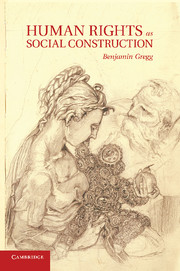Book contents
- Frontmatter
- Contents
- Acknowledgments
- Introduction
- Part I This-Worldly Norms: Local Not Universal
- Part II This-Worldly Resources for Human Rights as Social Construction
- Part III This-Worldly Means of Advancing the Human Rights Idea
- Part IV Human Rights, Future Tense: Human Nature and Political Community Reconceived
- 8 Human Rights via Human Nature as Cultural Choice
- 9 The Human Rights State
- Coda
- References
- Index
8 - Human Rights via Human Nature as Cultural Choice
Published online by Cambridge University Press: 05 January 2012
- Frontmatter
- Contents
- Acknowledgments
- Introduction
- Part I This-Worldly Norms: Local Not Universal
- Part II This-Worldly Resources for Human Rights as Social Construction
- Part III This-Worldly Means of Advancing the Human Rights Idea
- Part IV Human Rights, Future Tense: Human Nature and Political Community Reconceived
- 8 Human Rights via Human Nature as Cultural Choice
- 9 The Human Rights State
- Coda
- References
- Index
Summary
In Chapter 9 I argue for the human rights state as an alternative to the nation-state that we know today. The nation-state is not the state in which human rights most likely are available because it conceives of rights as granted by the state, a grant that depends on state sovereignty (the state need not grant rights to noncitizens, for example). Hence human rights in practical terms depend today on the nation-state, which, from empirical observation, in most cases today does not grant its citizens human rights. The human rights state, by contrast, understands people as human rights bearing as a matter of cultural choice rather than political membership (membership in the nation-state, indeed, in a particular nation-state). To make this choice, or to evaluate the choices of others, one must know when a human rights–bearing person is first present. At any stage along the biological development path prior to birth, for example? Any answer will presuppose a conception of man that justifies human rights assigned solely by virtue of being human. What conception of man renders human rights plausible in a way not dependent on a gratuitous grant of the nation-state? What conception corresponds to and facilitates the human rights state that I introduce in Chapter 9?
To anticipate the answer I develop in this chapter: a wholly naturalistic conception that takes human nature as biologically understood and eschews supernatural explanations, whether theological or metaphysical. That conception allows for cultural choice to construe people as human rights bearing. In a naturalistic conception, all rights are cultural constructions, as are all social institutions, from political communities to property rights to legal tender, from customs and mores to friendship and marriage.
- Type
- Chapter
- Information
- Human Rights as Social Construction , pp. 185 - 211Publisher: Cambridge University PressPrint publication year: 2011

